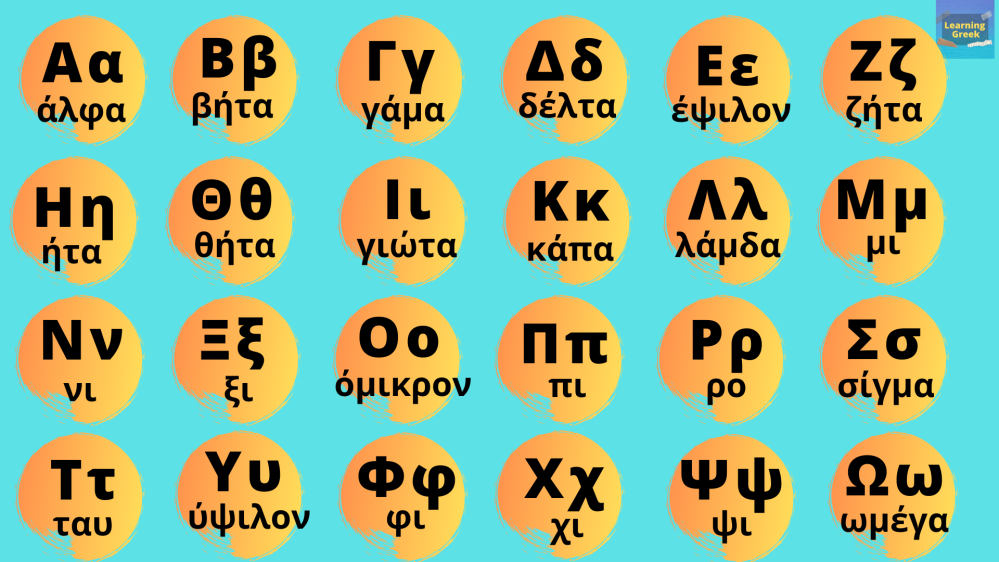Oh, my! The dreadful Greek alphabet!
This is how most people react when they see the Greek alphabet for the first
time. But, please, don’t be terrified! I know it can be overwhelming when
you are called to learn something new. This is why I’m here to help you learn
smoothly and without any anxiety.
Shall we begin?
Why learn an alphabet? Any alphabet
When you start learning a new language, one of the first things you MUST learn,
is its alphabet. You can’t go far with a language when you don’t know the basics.
And the alphabet is the most vital thing that will help you understand a language
thoroughly. But even if you don’t plan to learn Greek anytime soon, there are
some good reasons why you should learn at least the Greek alphabet.
A Brief History
Before we move on, let’s see some historical facts.
The Greek alphabet was developed around 1000 – 900 BC. It has its origin in the
Phoenician alphabet and it’s the oldest alphabetic system that is still in use. It is
the forebear of all European alphabets. Coptic, Cyrillic, Glagolitic, Gothic and
Latin. This is why some of its letters might look familiar to you.
Why is the Greek Alphabet so important?
Now let’s see some of these good reasons:
- Maths and science use many of the Greek alphabet letters as symbols. Even if you don’t like maths, like me – yes, guilty -, you probably have stumbled upon the famous letter Π (Pi) = 3,14. Yes, Π is a Greek letter. Other “famous” Greek letters are Σ (sigma) which can stand for “sum” or Δ (delta) which can stand for “change”. These are just a few examples to mark the importance of Greek letters in maths. If you want more, please ask your maths teacher who probably loves maths much more than me.
- Astronomy also really loves the use of Greek letters and names. For example, Άλφα (alpha) is the name they give to the biggest star in a constellation. Βήτα (beta) is the name of the second biggest star and so on.
- Computer science uses many of the Greek letters especially when it comes to coding.
- On college campuses, names of sororities and fraternities, all come from the Greek alphabet.
- Many of the English words are of Greek origin. Even the word “alphabet” derives from the first two letters of the Greek alphabet. Άλφα – Βήτα (Alpha – Beta).
Have I not convinced you yet of the importance of Greek Alphabet or should I
continue to act like Mr. Portokalos?
The Greek Alphabet
It is now time to really dig in to its core.
The modern Greek alphabet consists of 24 characters.
17 consonants: β, γ, δ, ζ, θ, κ, λ, μ, ν, ξ, π, ρ, σ (ς), τ, φ, χ, ψ
and 7 vowels: α, ε, η, ι, ο, υ, ω.
Words are formed by combining a consonant letter and a vowel. The Greek
language also forms words by using two-letter consonants, which together
form one sound.
Helping Images
In the image below, you can see the Greek alphabet and the name of its letter in Greek.

This second image below might be more helpful for you as a new starter as it
includes the letter names with the Latin/English pronunciation.

In the images below you can learn the alphabet along with the correct
pronunciation of the letters. It is divided in 4 parts each containing
6 letters in order to make it easier for you to learn it.
Part 1: Α – Ε

Part 2: Η – Μ

Part 3: Ν – Σ

Part 4: Τ – Ω

Note:
- Σ,σ and ς: When σίγμα (sigma) is written at the end of a word, it is written like this: “ς”. This only happens in lower case words. Greeks call that “ς” τελικό σίγμα (final sigma or final “s”)
The video
You can watch this video I have made, to see how each of the Greek letters is pronounced. Enjoy!
Conclusion
As you have probably understood by now, the Greek alphabet has played a great
role throughout history and its contribution to science and arts is significant.
Even if you don’t plan to learn Greek anytime soon – or never – the knowledge of
the Greek alphabet can aid you with a better understanding of maths and science
and can also give you a better appreciation of the Greek classics.
Now how amazing is that?

Hi I love this article and It has been helpful to me since I am learning Greek. So any assistance will be appreciated.
LikeLike
Hello and thanks! I’m happy that you’ve found it helpful 🙂
LikeLike
By the way …great article I don’t think it it is “maths”.. because math is a plural word.
LikeLike
Do you think I should spank my British editor?
LikeLike